Top Rankings
Richland School District ranks among the top 20% of public school district in Wisconsin for:
Category
Attribute
Student Attention
Lowest student:teacher ratio (Top 1%)
For the 2025 school year, there are 2 public preschools serving 306 students in Richland School District.
Public Preschools in Richland School District have a diversity score of 0.35, which is less than the Wisconsin public preschool average of 0.58.
Minority enrollment is 21% of the student body (majority Hispanic), which is less than the Wisconsin public preschool average of 38% (majority Hispanic and Black).
Overview
This School District
This State (WI)
# Schools
6 Schools
1,032 Schools
# Students
1,133 Students
339,535 Students
# Teachers
103 Teachers
24,694 Teachers
Student : Teacher Ratio
11:1
11:1
District Rank
Richland School District, which is ranked within the bottom 50% of all 444 school districts in Wisconsin (based off of combined math and reading proficiency testing data) for the 2021-2022 school year.
The school district's graduation rate of 90-94% has stayed relatively flat over five school years.
Overall District Rank
#384 out of 450 school districts
(Bottom 50%)
(Bottom 50%)
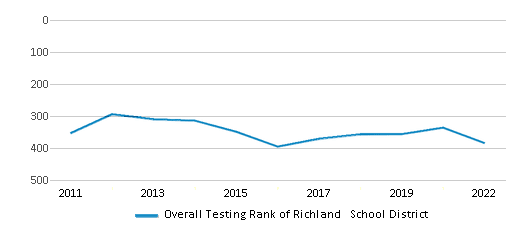
Math Test Scores (% Proficient)
26%
39%
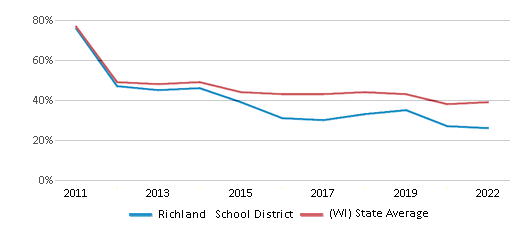
Reading/Language Arts Test Scores (% Proficient)
27%
38%
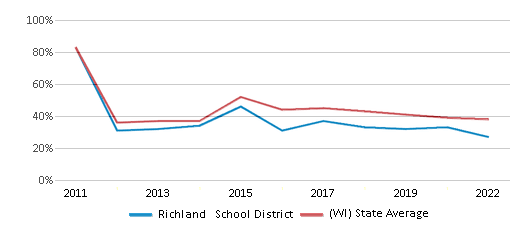
Science Test Scores (% Proficient)
39%
44%
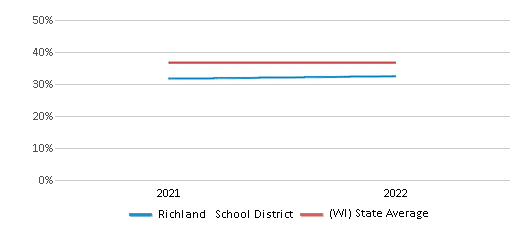
Graduation Rate
90-94%
90%
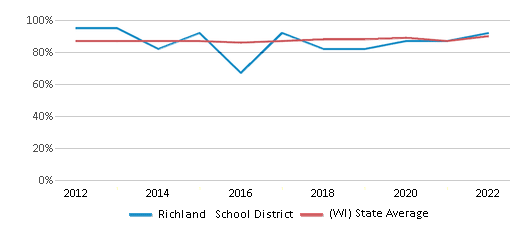
Students by Ethnicity:
Diversity Score
0.32
0.58
# American Indian Students
1 Student
3,435 Students
% American Indian Students
n/a
1%
# Asian Students
6 Students
15,647 Students
% Asian Students
n/a
5%
# Hispanic Students
132 Students
52,197 Students
% Hispanic Students
12%
15%
# Black Students
20 Students
39,149 Students
% Black Students
2%
11%
# White Students
926 Students
209,143 Students
% White Students
82%
62%
# Hawaiian Students
n/a
297 Students
% Hawaiian Students
n/a
n/a
# Two or more races Students
48 Students
19,658 Students
% of Two or more races Students
4%
6%
Students by Grade:
# Students in PK Grade:
77
50,321
# Students in K Grade:
74
44,890
# Students in 1st Grade:
79
45,508
# Students in 2nd Grade:
76
45,837
# Students in 3rd Grade:
66
43,291
# Students in 4th Grade:
69
42,370
# Students in 5th Grade:
71
35,557
# Students in 6th Grade:
62
11,124
# Students in 7th Grade:
66
7,438
# Students in 8th Grade:
85
7,747
# Students in 9th Grade:
109
1,444
# Students in 10th Grade:
99
1,335
# Students in 11th Grade:
94
1,345
# Students in 12th Grade:
106
1,328
# Ungraded Students:
-
-
District Revenue and Spending
The revenue/student of $19,432 is higher than the state median of $17,039. The school district revenue/student has grown by 6% over four school years.
The school district's spending/student of $18,769 is higher than the state median of $17,011. The school district spending/student has grown by 6% over four school years.
Total Revenue
$22 MM
$13,869 MM
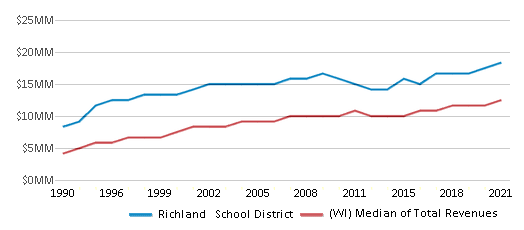
Spending
$21 MM
$13,846 MM
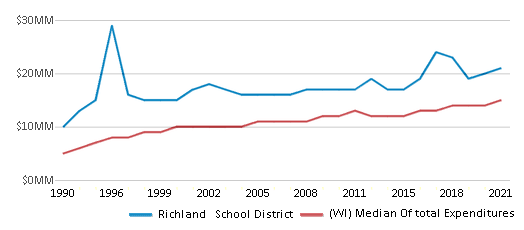
Revenue / Student
$19,432
$17,039
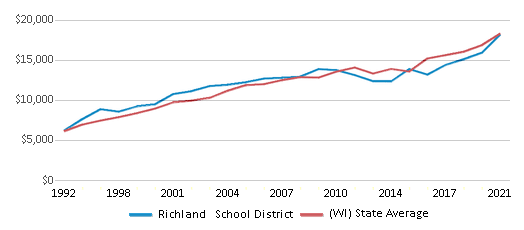
Spending / Student
$18,769
$17,011
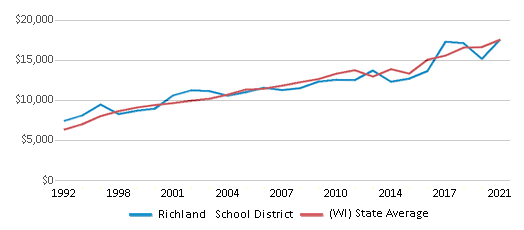
Best Richland School District Public Preschools (2025)
School
(Math and Reading Proficiency)
(Math and Reading Proficiency)
Location
Grades
Students
Rank: #11.
Richland Center Primary School
(Math: 20-24% | Reading: 10-14% )
Rank:
Rank:
2/
Bottom 50%10
1990 Bohmann Dr
Richland Center, WI 53581
(608) 647-8971
Richland Center, WI 53581
(608) 647-8971
Grades: PK-2
| 305 students
Rank: n/an/a
25500 Rockbridge School St
Richland Center, WI 53581
(608) 495-4905
Richland Center, WI 53581
(608) 495-4905
Grades: PK
| 1 students
Recent Articles

Year-Round Or Traditional Schedule?
Which is more appropriate for your child? A year-round attendance schedule or traditional schedule? We look at the pros and cons.

Why You Should Encourage Your Child to Join a Sports Team
Participating in team sports has a great many benefits for children, there is no doubt. In this article you will learn what those benefits are.

White Students are Now the Minority in U.S. Public Schools
Increasing birth rates among immigrant families from Asia and Central and South America, combined with lower birth rates among white families, means that for the first time in history, public school students in the United States are majority-minority. This shift in demographics poses difficulties for schools as they work to accommodate children of varying language abilities and socio-economic backgrounds.





